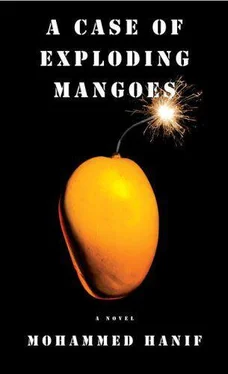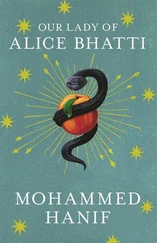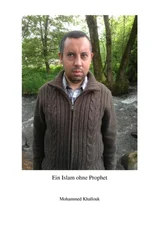The speech was going to be simple. He would keep it short and punchy. He would not go into long-winded formalities like General Zia did—‘my brothers, and sisters and uncles and aunts’. His message would be short. In a mere ten lines, which would last no more than a minute and a half, he would change the course of history. “My fellow countrymen. Our dear President’s plane had an unfortunate accident in mid-air soon after taking off from an airfield in Bahawalpur…”
He read the sentence again. It did not seem very believable to him. There was something about it that didn’t ring true. He should probably explain what had happened. A mechanical failure? He couldn’t possibly say sabotage but he could hint at it. He crossed out the words ‘ had an unfortunate accident ’ and replaced it with ‘ exploded ’. This sounds punchier, he thought. He added another sentence in the margin. ‘ We are surrounded by enemies who want to derail the country from the path of prosperity… ’ He decided to stick with the unfortunate accident after all but added: ‘ The reasons for this tragic plane crash are not known. An inquiry has been ordered and the culprits, if any, will be brought to swift justice according to the law of this land .’
He picked up the phone absent-mindedly. It was still working. He thought long and hard about the closing line of his speech. He needed something that would tie it all up, something original, something uplifting. There had been too much God-mongering under General Zia and he felt the Americans might like a nice secular gesture, something that would sound scholarly, reassuring and quotable. He was still divided between ‘ we as a front-line state against the rising tide of communism ’ and ‘ we as a frontline state against the flood of communism ’ when the phone rang. Without any preliminaries Major Kiyani read him a weather report. “Two low-pressure zones that were gathering in the south are headed northwards. Delta One is definitely going to overtake Delta Two.” Instead of putting the phone down, General Akhtar pressed his forefinger on the cradle and went through a mental checklist, a list he had been through so many times that he felt that he could not be objective about it any more. He decided to go through it backwards.
9. Address to the nation: almost ready.
8. Black sherwani for the address to the nation: pressed and tried.
7. US reaction: predictable. Call Arnold Raphel and reassure him.
6. Where should I be when the news breaks: inaugurating the new Officers’ Club in General Headquarters.
5. If Shigri boy has a go: problem solved before take-off. If Shigri boy loses his marbles: the plan goes ahead.
4. The air freshener doesn’t work: nothing happens.
3. The air freshener works: no survivors. NO AUTOPSIES.
2. Does he deserve to die? He has become an existential threat to the country.
1. Am I ready for the responsibility that Allah is about to bestow upon me?
General Akhtar shook his head slowly and dialled the number. Without any greetings he read out the weather report, then gave a pause and before replacing the receiver said in loud and clear voice. “Lavender.”
He suddenly felt sleepy. He told himself that he would decide the last sentence of his speech in the morning. Maybe something would be revealed to him in his dreams. He looked into his wardrobe before going to bed and took a long look at the black sherwani in which he would appear before the nation tomorrow. His hope about figuring out the last sentence of his speech in his dreams turned out to be false. He slept the sleep of someone who knows he will wake up a king.
What woke him up was the red phone at his bedside, a call from General Zia. “Brother Akhtar. Forgive me for bothering you so early but I am taking the most important decision of my life today and I want you to be here at my side. Join me on Pak One.”
The C13O carrying my Silent Drill Squad smells of animal piss and leaking aircraft fuel. My boys are sitting on the nylon-webbed seats facing each other with their legs stretched to preserve the starched creases of their uniforms. They are carrying their peaked caps in plastic bags to keep the golden-threaded air force insignia shiny. Obaid’s head has been buried in a slim book since take-off. I glance at the cover; a bawdy illustration of a fat woman, part of the title is covered by Obaid’s hand. “… of a Death Foretold ” is all I can read.
“What is it?” I grab the book from him, go to the first page and read the first sentence.
“So does Nasr really die?”
“I think so.”
“It says so right here in the first sentence. Why keep reading it when you already know that the hero is going to die.”
“To see how he dies. What were his last words. That kind of thing.”
“You are a pervert, comrade.” I throw the book back at him.
“How about a rehearsal?” I shout above the din of the aeroplane.
My squad looks at me with weary eyes, Obaid curses under his breath. They line up sluggishly in the middle of the cabin. I can see their hearts are not in it. The smelly cabin of an aeroplane that has recently been used to transport sick animals, cruising at thirty thousand feet, is not the best setting for our elegant drill routine. But then the pursuit of perfection can’t wait for the ideal environment.
We are in the middle of a rifle salute when the aeroplane hits turbulence. I stand and watch their reactions. Despite a sudden drop in altitude, followed by regular shuddering of the aircraft, my boys manage to hold onto their rifles and their positions. I bring the hilt of my sword to my lips, the tip of the sword is tinged a steel blue with Uncle Starchy’s nectar. I put the sword back in the velvet-lined scabbard and watch them. The aeroplane goes into a thirty-degree turn and I am suddenly skidding towards my squad, trying to maintain my balance. Obaid puts his arm around my waist to steady me. The loadmaster shouts from the back of the plane. “Sit down, please. Sit down. We are coming in for landing.”
The aeroplane starts to descend. My inner cadence tells me that my mission starts now. My poison-tipped sword tells me that it’s ready.
An unmarked white Toyota Corolla started its journey from Rawalpindi with the intention of covering the 530-mile distance to Bahawalpur in five hours and thirty minutes. Those who encountered the car and its maniacal driver along the route were almost certain that the driver would not survive the next ten miles. The car ran over stray dogs and broke up cowherds making their way to the rubbish dumps in the suburbs. It zoomed through crowded city junctions, threatened and overtook the most macho of truck drivers. It didn’t stop for children waiting at zebra crossings, it honked its horn at slow horsecarts, it swerved and dodged public transport buses, it threatened to run through railway crossings, it ran down footpaths when it couldn’t find its way ahead on jammed roads, it was pursued in a futile chase by a road-tax inspector, it was sworn at by labourers repairing the roads, it stopped for refuelling at a petrol station and then took off without paying. The driver of the car was obviously in a hurry. Many of the people who saw the car whizz past were sure that the man driving it was suicidal. They were wrong.
Far from being suicidal, Major Kiyani was on a mission to save lives.
He had personally supervised the last dusting of the VIP pod and inserted the lavender air freshener in the air-conditioning duct. He was there when the pod was lifted by a crane, rolled into the C130’s fuselage through its back ramp and fastened to the floor of the cabin by the air force technicians. He had to leave the VIP area and retreat to his office as General Zia’s entourage started to arrive; in his new job he didn’t have the security clearance to be around the red carpet.
Читать дальше












